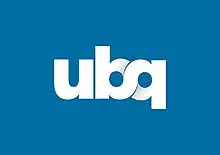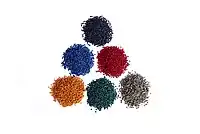UBQ Materials
UBQ Materials is a cleantech company that converts household and municipal waste into bio-based thermoplastic composite for reuse in the manufacturing of substitute plastics and durable products.[1][2][3] The company is an Israeli start-up founded by Rabbi Yehuda Pearl, who also founded hummus brand Sabra[4] and Jack (Tato) Bigio, CEO of UBQ Materials Israel. It is a Certified B Corporation.[5] In March 2020, the company named Mike Thaman, former chairman and chief executive officer of Owens Corning, as its chief executive officer.[6][7]
 | |
| Founded | 2012 |
|---|---|
| Headquarters | , |
Key people | Mike Thaman (CEO) Jack (Tato) Bigio (Co-Founder) Yehuda Pearl (Co-Founder) |
| Website | ubqmaterials |
History
UBQ Materials was founded in 2012 by Jack (Tato) Bigio and Yehuda Pearl. Prior to UBQ Materials, Bigio co-founded and managed Merhav Renewable Energies (MRE), and Pearl established Sabra Dipping Co., a hummus brand sold to PepsiCo in 2007. UBQ has raised $27 million from private investors[2] and from global venture capital funds Battery Ventures and EASME. UBQ has offices located in Tel Aviv, Israel, and a manufacturing plant in Kibbutz Tze'elim in the Negev area of southern Israel. The patented UBQ product and manufacturing process was developed between 2012 and 2017. In 2018, UBQ began commercial production.
Technology
UBQ waste conversion technology produces thermoplastic pellets as an alternative to oil-based resources that are traditionally used in plastics manufacturing.[8][9][10][11] UBQ technology extracts metal, glass, minerals, cardboard and paper for further recycling. Household food waste, paper, cardboard and dirty plastics are dried and milled into a powder and reconstituted into a plastic-like composite. The resulting pellets are integrated with standard plastic pellets by conventional plastics manufacturers to create substitute plastic materials.[12]

Production Process
The raw materials of the process are organic materials and mixed plastics.[11] Each stream is broken down to its core components. Residual solid municipal waste (fabrics, paper, cardboard and mixed plastics) and organic waste (food waste and paper) typically comprising about 70% of feedstock weight, is broken down to its particulate components - lignin, cellulose, fibers, and sugars - then reassembled and bound together into a matrix to create a thermoplastic composite material in pellet or powder form.[12] During production, minimal energy and no water are used thereby reducing greenhouse gas emissions and residual waste by-products. For every ton of material produced, the process prevents the equivalent of 3-30 tons of CO2 from being created by keeping waste from decomposing in landfills.[13]
Application
Bio-based thermoplastic UBQ material is used in injection, compression molding, extrusion and 3D printing, and is compatible with PP, PE, PLA, and PVC.[12] It typically has concentrations of 30% to 100%.[14] It may be compounded with additives to modify coloration, impact strength, and UV resistance.[15]
Partnerships
State of Virginia
In August 2019, Virginia’s Waste Management Authority became the first U.S. company to purchase waste containers made of UBQ in Richmond, Virginia and the surrounding area.[16]
McDonald's
In November 2019, UBQ Materials entered into a collaboration with fast-food chain McDonald's Latin America franchisee Arcos Dorados to provide UBQ product to McDonald's Latin America restaurants and supply chains.[17]
References
- Morrison, Jim; Kordova, Shoshana (2019-11-18). "Revolutionary recycling? A new technology turns everyday trash into plastic treasure". Washington Post.
- Zion, Ilan Ben. "Waste recycling: Israeli business says it can turn garbage into plastic products". USA TODAY. Retrieved 2020-08-20.
- "Tomlinson: Israeli company challenges plastic industry with material made from garbage". HoustonChronicle.com. 2020-05-04. Retrieved 2020-08-20.
- "Sabra Hummus founder could bring 'game changer' company to Virginia". WTVR. August 28, 2019.
- "U.B.Q MATERIALS LTD | Certified B Corporation". bcorporation.net.
- "Fortune 500 CEO to scale Israeli waste-to-plastic solution globally". The Jerusalem Post | JPost.com. Retrieved 2020-08-20.
- "Mike Thaman | UBQ Materials". UBQ™ Material - Waste to Sustainable Material. Retrieved 2020-08-20.
- Lazarus, Jeremy M. (2019-09-06). "Israeli company introduces recycling bins for CVWMA made from recycled waste". richmondfreepress.com. Retrieved 2020-08-20.
- "UBQ enters US market with recycled materials, containers". Plastics News. September 9, 2019.
- Cottom, Theresa (2019-08-29). "Virginia debuts partnership to turn MSW into plastic substitute". Recycling Today. Retrieved 2020-08-20.
- "Israeli firm says it can turn garbage into bio-based plastic". AP NEWS. 2018-03-22. Retrieved 2020-08-20.
- Kosciulek, Samara Abramson, Mark Abadi, Amelia. "Investors are pouring billions into the alternative plastics industry — and these companies are racing to deliver". Business Insider. Retrieved 2020-08-20.
- "Trash company boasts its new technology will make landfills obsolete". New York Post. Associated Press. 2018-03-22. Retrieved 2020-08-20.
- "UBQ Materials". GIE. Retrieved 2020-08-20.
- "Israel-Based UBQ Materials is Turning Garbage into Recyclable Plastic". Waste360. 2020-05-07. Retrieved 2020-08-20.
- Solomon, Shoshanna. "Central Virginians to put out their recycling in Israeli plastic-substitute bins". www.timesofisrael.com. Retrieved 2020-08-20.
- www.bloomberg.com https://www.bloomberg.com/press-releases/2019-11-21/arcos-dorados-partners-with-ubq-to-use-climate-positive-materials-in-mcdonald-s-restaurants. Retrieved 2020-08-20. Missing or empty
|title=(help) - Etsion, Udi (2020-01-21). "Israel's Trash Could Be Mercedes' Treasure". CTECH - www.calcalistech.com. Retrieved 2020-08-20.
- Daimler. "Zero waste production is possible". Daimler. Retrieved 2020-08-20.